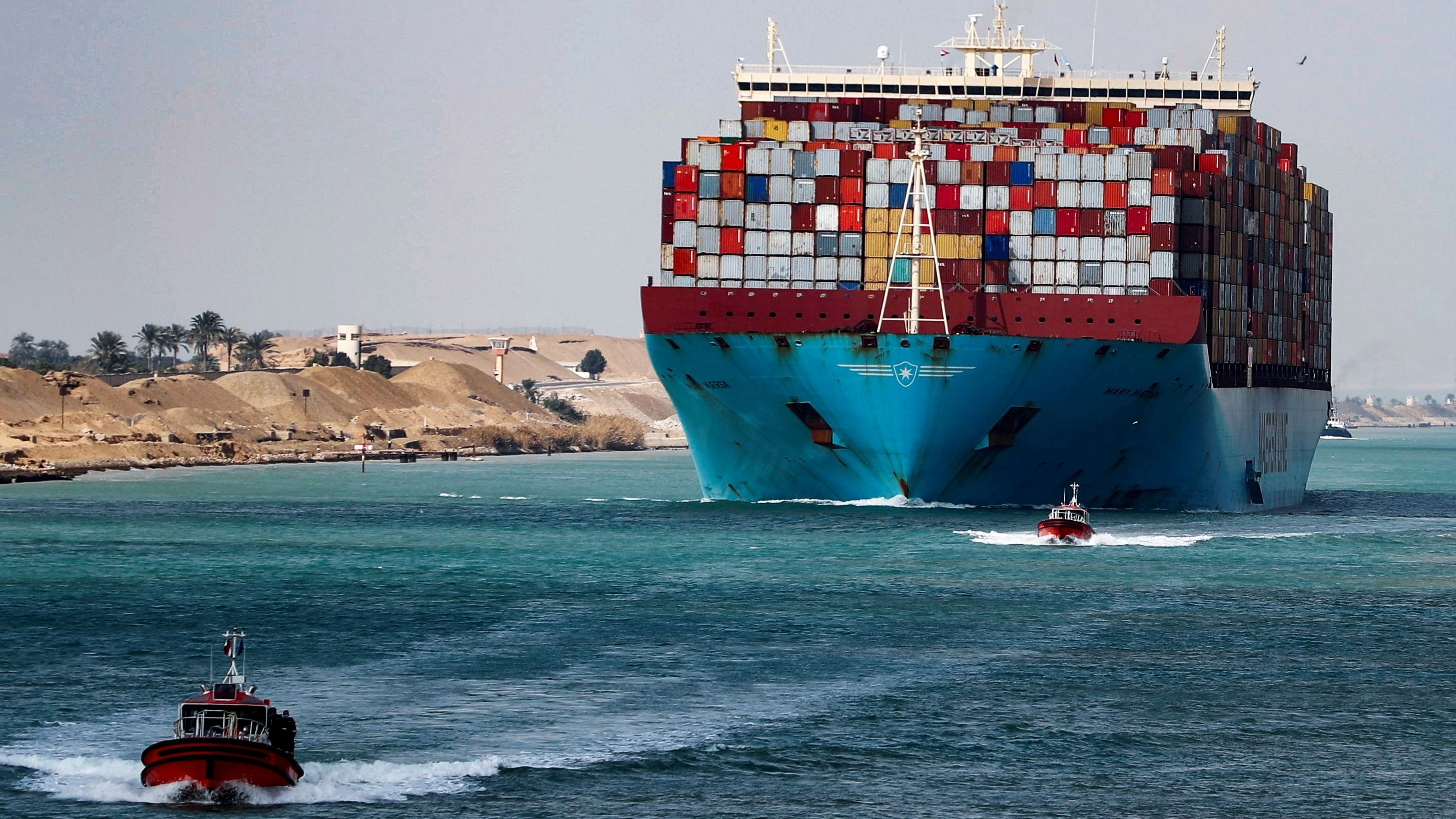
A shipping container passes through the Suez Canal in Suez, Egypt
Credit: Reuters Photo
Bengaluru: The persistent attacks by Iran-backed Houthi rebels, who control large parts of Yemen, on cargo ships transiting through the Red Sea, are having an impact on Indian maritime trade and commerce.
Shipping industry insiders and experts say that the disruption on this crucial trade route can lead to a domino effect of additional insurance premiums for the industry going up by Rs 10-15 lakh, around a 30 per cent increase in container freight rates, and an average two-week increase in shipping time for vessels avoiding the Suez Canal.
"Average monthly export to Europe, North Africa and Mediterranean Middle East and North America is about $11-$2 billion. The estimated impact on shipments in the last 15 days would be in the tune of $30-$60 million. This is a broad estimate for exporters only," said Subhabrata Sengupta, Partner, Avalon Consulting.
Credit: DH Design team
Indian exports to Europe and east coast of USA use the Suez canal. With Houthi rebels targeting non-Israel bound ships and major liners announcing a decision to avoid the Red Sea, the cargo has to go via the Cape of Good Hope, the old seafaring route.
As the attacks are continuing, the final figures on the incurred losses due to the security concerns along the Red Sea are still being worked out. The Red Sea's Bab-el-Mandeb strait, which sees nearly 12 per cent of the global shipping trade pass through, is tied to the Israel-Palestine conflict conflict in West Asia.
"About 25 per cent of international container cargo goes through the Suez Canal, and re-routing can effectively reduce up to 10 per cent of global shipping capacity," said Davinder Sandhu, co-founder and chairman of consultancy firm Primus Partners.
Sengupta estimated the net impact to be between 0.7 and 1 per cent of the cargo value.
A re-routing can also cost shipping companies an additional $1 million in fuel for every round trip between the Far East and North Europe. Indian exporters are also staring at an increased shipping time between Mundra and Rotterdam by a third, with freight rates also likely to go up.
About 20 per cent of India's exports (valued at roughly $200 billion) pass through the Red Sea-Suez route. The industries that are expected to be directly affected in India include those exporting manufactured goods such as automotive parts, agricultural products, chemicals, textiles, readymade garments and pharmaceutical products.
"These sectors heavily rely on efficient and cost-effective shipping routes for timely delivery and competitive pricing in global markets. The potential surge in freight costs and logistical challenges can directly impact their competitiveness and profit margins, affecting their ability to compete on a global scale," said Pushpank Kaushik, chief executive officer of shipbroking and freight forwarding company Jassper Shipping.
Experts believe that India's crude oil trade would not be hampered by the crisis, especially since futures prices are locked in.
As 85 per cent of Indian crude is imported via the Strait of Hormuz (in the Persian Gulf) and Russian crude in transit to India via the Suez is believed to be untouched by Houthis, there is no direct impact that India faces, according to experts. However, indirect impacts may be felt through rising global crude prices because of the effect on international crude trade.
Experts have pointed out that air cargo as an alternative to offset the shipping delays is unviable due to low volumes and high freight rates.
Industry watchers predict a spillover effect of the crisis in the fourth quarter of financial year 2024. "The impact is to be seen in Q4FY24 results for the businesses in these sectors," said Prashant Vasisht, Senior Vice President & Co-Group Head - Corporate Ratings, ICRA Ltd.
"This being a geopolitical event, it is difficult to predict the duration. However, if it goes on, we could see price pressures in the impacted industries which could then be passed on to the customers as well," Vashisht underlined.
This would result in people paying a premium while purchasing goods, particularly imported ones.
According to Sengupta, if the situation protracts and supply chains are impacted, some customers may switch to nearshore suppliers, underscoring that the impacts will be significant for other countries more than India.